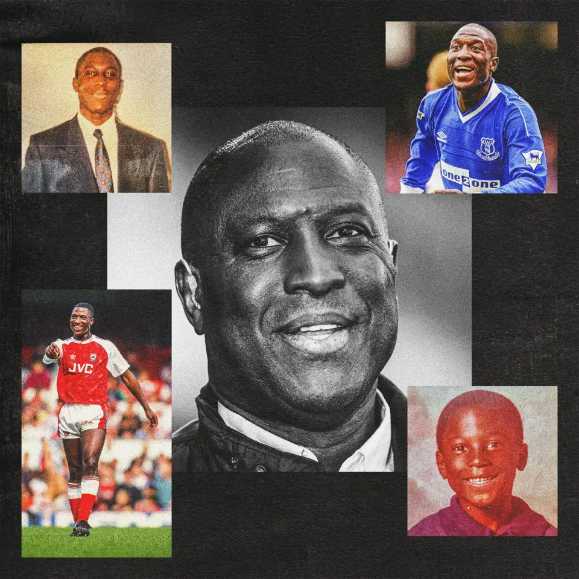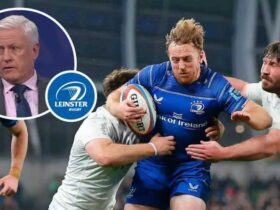Kevin Campbell was the all-action, hard-grafting centre-forward who delighted football fans with great goals across a 19-year career at the top of the game.
Affectionately known as Super Kev at Arsenal, Nottingham Forest and Everton, he developed a reputation as one of the hardest-to-handle forwards in the country, while his beaming smile and joyous celebrations made him one of English football’s most popular characters.
“I think if you ask anyone who’s ever been in the presence of him, they’ll always remember him and speak about how good a person he was,” says Campbell’s son Tyrese, 25, who plays as a striker for Sheffield United. “He carried the whole room – you knew when he was in there because you could probably hear him.
“He was a respectful, happy, positive person. You could even say almost too good for this Earth. A proper angel sent from heaven.”
In 2024 Kevin Campbell’s life was tragically cut short after he suffered a serious illness, and an investigation was launched into concerns over his care.
After his inquest concluded on Monday, this is the story of Campbell’s life, loss and legacy, told by those who knew him best.
Brixton, south London, 1970-80s
Campbell will eventually raise his own family in the north-west, but is born in south London in 1970, the second youngest of seven children in a family with Jamaican roots.
“We were brought up by a single mother so resources were extremely tight,” Campbell’s younger sister Lorna says. “We used to play tennis against a back wall because we couldn’t afford to hire a court. Kevin wanted to be in different football teams and it was a struggle for my mother to pay all the subs.
“We had three big brothers and he was never afraid to play football with them and their friends – he would just take them on. And this was on the mean streets of Brixton. That’s when he came alive.”
Manchester, January-March 2024
Campbell begins to feel unwell. His symptoms are generic – tiredness, loss of appetite, a decrease in weight.
Despite insisting that family and friends need not worry, in the following months he has multiple stays in hospitals in Greater Manchester. His appearance changes as he becomes visibly weaker. Doctors are unsure what is causing Campbell’s symptoms.
According to an eventual inquest, he is discharged in March 2024 after “responding well to treatment”.
Highbury, north London, 1985-95
Campbell’s natural talent means he is scouted by multiple professional clubs in London, and he chooses to sign a youth deal at Arsenal.
“When I joined Arsenal at 16, he was a young kid, about nine,” says Paul Davis, a midfielder with the Gunners between 1980 and 1995. “That’s when I started to hear his name – people saying ‘this guy is scoring plenty of goals’.
“Then he came up to train with the first team. We see this big guy – six foot one, 17, wide, his legs are so thick and chunky. And everyone’s thinking, ‘Wow, no wonder he’s scoring goals’. He was just knocking everybody over. We had people like Kenny Sansom, Viv Anderson – senior internationals – and when they saw Kevin coming over they would be like ‘oh no’ because they knew he would embarrass them in training.
“When I first came through I was the only black player at Arsenal. You’ve got to remember the culture of the country meant it was OK to tell off-colour jokes. So if you had somebody that was in the struggle with you, then it made it easier.
“Kevin would always challenge things in a way that didn’t end up with a fight. He was able to do it and they thought, ‘actually, should I be saying this, or should I be doing this?'”
Andy Cole, the fourth top goalscorer in Premier League history, begins playing alongside Campbell when both are coming through the youth ranks at Arsenal. The pair combine in a successful FA Youth Cup campaign, and become friends.
“Unbelievable strength and power,” Cole says of Campbell’s style. “He was quick as well. And to be fair Kevin didn’t have to be aggressive, because the size of him meant people feared him anyway. I think everyone enjoyed playing with him due to the fact that he worked so hard for his team.”
After making his first-team debut in 1988, Campbell wins two league titles as well as the FA Cup, League Cup, and European Cup Winners’ Cup in a seven-year spell with the Gunners in which his joyous goal celebrations and gregarious character make him a fan favourite.
“Kevin had a larger than life personality,” Cole says. “He could walk into a room and light it up – life and soul of the party.
“I remember one night Kevin took me out, we had a good laugh. Unfortunately for me I was in the next day and Kevin had the day off. We were doing stand runs at Highbury. Man, I couldn’t raise a gallop.
“I remember [Arsenal youth-team coach] Pat Rice saw Kevin and said, ‘Kevin! Did you take Coley out last night?’ Kevin was like ‘Pfft, nah, I don’t know what you’re talking about, Pat.’ I was just laughing… if Pat ever knew.”
Manchester, May 2024
Campbell’s condition worsens and he begins a long stay in Manchester Royal Infirmary. He has lost over half his body weight.
Friends and family become aware that his illness is more serious than first believed.
His friend Jason Lavelle says: “When I went to see him, I met his brothers beforehand and they did prep me for the fact that he had lost a lot of weight, that he wouldn’t look the same as what I remember him as. And that was the case.
“In my mind’s mind I was still thinking ‘this is Kevin, Super Kevin, and he is seriously ill but he is still going to pull through this.”
Cole explains: “I got a phone call from someone saying ‘Coles, just letting you know that Kevin’s not very well’.
“I knew mentally I couldn’t see him like that. I just… I couldn’t bring myself to see Kev in that state after knowing him being fit, strong.”
Eventually, the cause of Campbell’s illness is discovered. He is suffering from infective endocarditis, an infection in the inner lining of the heart or its valves which affects one in 30,000 people in the UK.
“It’s often very difficult to diagnose,” says Dr Debbie Harrington, consultant aortic surgeon at Liverpool Heart and Chest Hospital.
“Often patients will present with very non-specific symptoms that have gone on for months. They won’t necessarily be seen by a specialist in cardiology who is going to think of the right diagnosis.”
“When we have problems where patients sadly don’t make it, often it’s because they get to us too late – that is usually the reason why patients don’t survive.
“Overall in the general medical community I would say there is probably a lack of awareness of infective endocarditis – we know that it is actually on the increase. Definitely awareness is a big, big factor.”
Liverpool, 1999-2005
After leaving Arsenal to play for Nottingham Forest in 1995, striking up a lethal striker partnership with Pierre van Hooijdonk, Campbell spends a brief spell with Trabzonspor in Turkey.
But Campbell is racially abused by the club’s president after signing, and seven months later moves back to the Premier League, joining Everton. There, he becomes the club’s first black captain, scores crucial goals to keep the Toffees in the top flight, and mentors a young Wayne Rooney.
“He was an inspiration, really,” Rooney says. “Everton were struggling for a few years and he galvanised the whole club.











Leave a Reply